It is possible to observe a love and hate relationship between the politics and religion in Turkey. On the one hand, state ideology produced an assertive secularist approach which was carried by the Republican People's Party -the RPP- until recent years (Kuru 2009), on the other hand, the political realm to a large extent filled by the religious discourses and symbols from the very beginning of the multiparty system. Today, the Justice and Development Party –the JDP- as the representative of conservative center-right and the RPP, as the representative of secularist center-left are two dominant parties in Turkish politics. On the other hand, there exist particular brotherhoods and movements whose weights are appreciably increased in the political realm in the last decades. This research aims to investigate the interaction of religion and politics from the both sides' implications. First, two dominant parties' discourses regarding party programs, leaders' speeches and election campaigns will be analyzed. Then, the same analysis shall be conducted with the head of certain religious group leaders. These leaders will be from 1. Fethullah Gülen group, 2. Reader sect of Nurcu religious order, 3. İskenderpaşa brotherhood and 4. Menzil brotherhood. These four representatives' views on daily Turkish politics, ambitions to get involved in policy making processes as well as perspectives towards the Turkey's accession process to European Union will be analyzed. At the end of this research, I would like to indicate on the one hand to what extent the Turkish politics is religionized. On the other hand, this research shall help to analyze to what extent religious organizations are politicized in order to see the interaction between the politics and religion in Turkey.
Reference:
Ahmet Kuru. 2009. Secularism and State Policies Toward the Religion: The United States, France, and Turkey. Cambridge: Cambridge University Press.

 PDF version
PDF version
